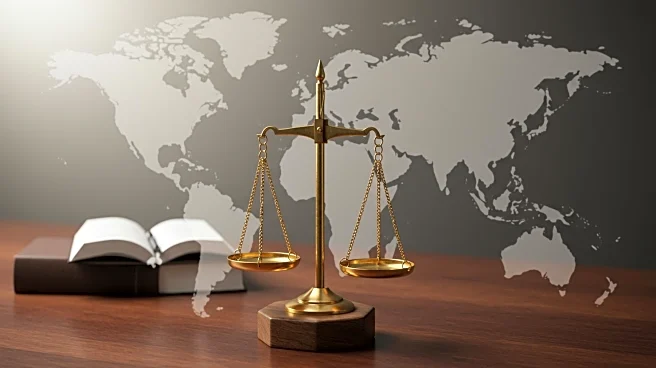What is the story about?
What's Happening?
Immigration officials in the United States have announced their intention to deport Kilmar Abrego Garcia to Uganda. This decision follows Abrego Garcia's refusal to accept a plea deal that would have seen him deported to Costa Rica in exchange for pleading guilty to human smuggling charges. Abrego Garcia, a Salvadoran national, was released from a Tennessee jail and is awaiting trial in Maryland. The Department of Homeland Security informed his attorneys of the deportation plan shortly after his release. Abrego Garcia's case has been a focal point in President Trump's immigration policy, especially after he was mistakenly deported in March and subsequently returned to the U.S. in June. He has pleaded not guilty to the charges and is seeking to have the case dismissed, arguing that the prosecution is retaliatory.
Why It's Important?
The case of Kilmar Abrego Garcia highlights ongoing tensions and legal complexities within U.S. immigration policy under President Trump's administration. The decision to deport him to Uganda, despite previous arrangements with Costa Rica, underscores the administration's aggressive stance on immigration enforcement. This situation could have broader implications for how similar cases are handled, potentially affecting the rights of individuals facing deportation and the legal processes involved. The case also reflects the challenges faced by immigrants in navigating the U.S. legal system, particularly under policies that have been criticized for being harsh and punitive.
What's Next?
Abrego Garcia is expected to report to immigration authorities in Baltimore on Monday. His legal team is likely to continue challenging the deportation order, arguing that it is vindictive. The outcome of this case could influence future legal strategies for immigrants facing deportation and may prompt further scrutiny of the administration's immigration policies. Stakeholders, including immigration advocacy groups and legal experts, will be closely monitoring the developments, which could lead to broader discussions on immigration reform and the rights of non-citizens in the U.S.
Beyond the Headlines
The case raises ethical questions about the treatment of immigrants and the fairness of the legal processes they face. It also highlights the potential for political motivations to influence legal decisions, which could have long-term implications for the integrity of the U.S. justice system. The situation may also impact international relations, particularly with countries involved in deportation agreements.
















